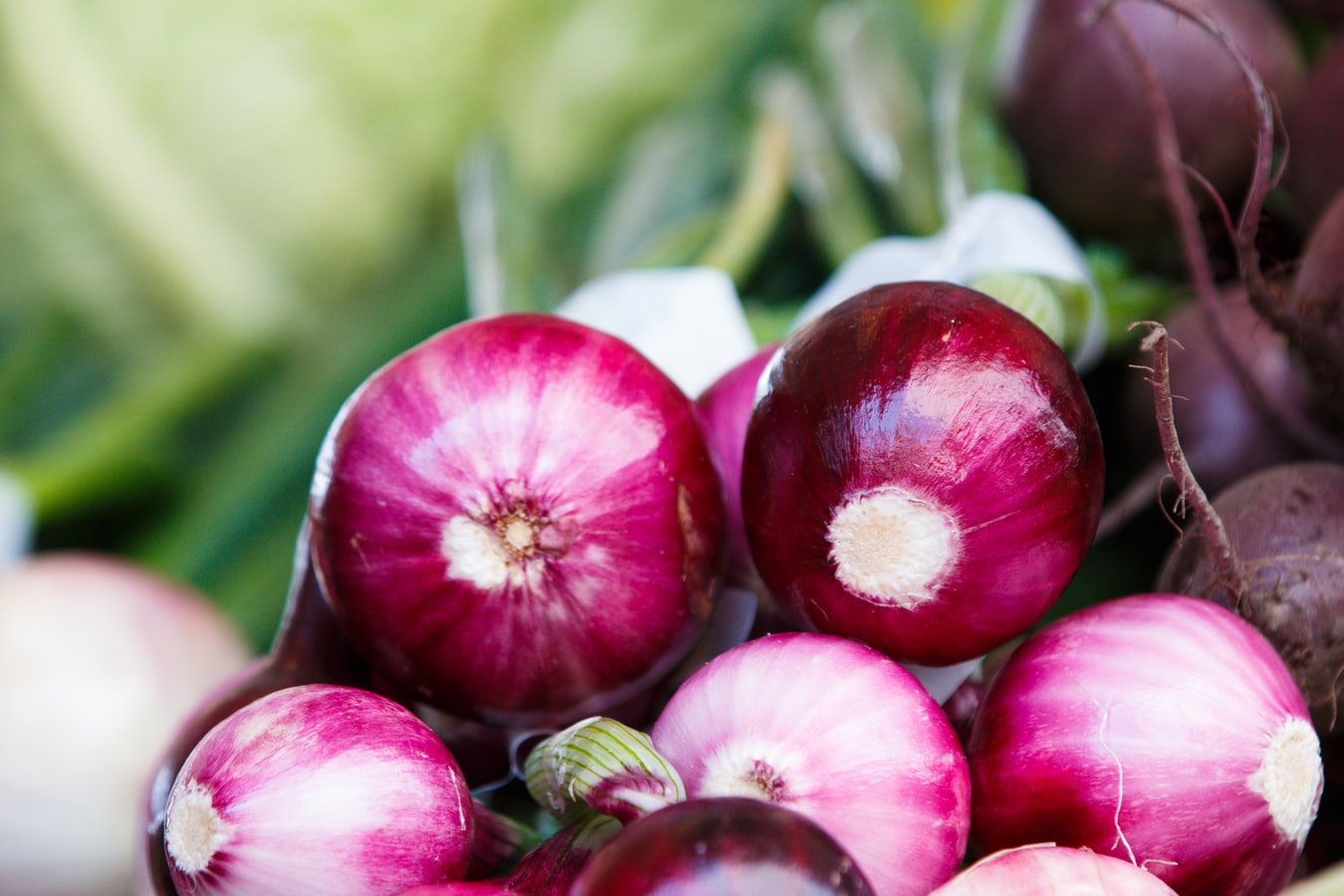Canada News
Public Health Notice: Outbreak of Salmonella infections linked to red onions imported from the United States

Although the investigation has determined that red onions are the likely source of the outbreak, Thomson International Inc. has recalled all varieties of onions that could have come in contact with potentially contaminated red onions, due to the risk of cross-contamination. Onion varieties includes red, white, yellow, and sweet yellow onions. (File Photo: Thomas Martinsen/Unsplash)
OTTAWA, ON /CNW/ – Since July 30, there have been six additional illnesses reported in the ongoing Canadian investigation, including illnesses in Saskatchewan and Québec. There are now 120 confirmed cases in Canada. Investigators have determined that potentially contaminated red onions are coming from Thomson International Inc. of Bakersfield, California, United States of America (USA).
Although the investigation has determined that red onions are the likely source of the outbreak, Thomson International Inc. has recalled all varieties of onions that could have come in contact with potentially contaminated red onions, due to the risk of cross-contamination. Onion varieties includes red, white, yellow, and sweet yellow onions.
The Canadian Food Inspection Agency (CFIA) has issued food recall warnings for related products that came to Canada. Some of these products were possibly distributed nationally. Additional food recall warnings in Canada are possible. More information on recalled products is available on CFIA’s website.
Given this new information, and until more is known about the outbreak, do not eat, use, sell or serve any red, white, yellow, and sweet yellow onions from Thomson International Inc., Bakersfield, California, USA, or any products made with these onions. This advice applies to all individuals across Canada, as well as retailers, distributors, manufacturers and food service establishments such as hotels, restaurants, cafeterias, hospitals and nursing homes.
Onions grown in Canada are not affected by this advice.
Why should you take note
The Public Health Agency of Canada (PHAC) is collaborating with federal and provincial public health partners, the United States Centers for Disease Control and Prevention (U.S. CDC), and the U.S. Food and Drug Administration to investigate an outbreak of Salmonella infections occurring in seven provinces.
In Canada, based on the investigation findings to date, exposure to red onions imported from the USA has been identified as a likely source of the outbreak. Many of the ill individuals under investigation reported having eaten red onions before getting sick.
Through a collaborative investigation between public health and food safety partners in Canada and the U.S., traceback information has identified that the contaminated red onions are coming from Thomson International Inc. of Bakersfield, California, USA.
The CFIA has issued food recall warnings for related products that came to Canada. Some of these products were possibly distributed nationally. Additional food recall warnings in Canada are possible. More information is needed to determine the cause of contamination in red onions imported from Thomson International Inc. The outbreak is ongoing, as recent illnesses continue to be reported to the PHAC.
Given this new information, and until more is known about the outbreak, do not eat, use, sell or serve any red, yellow, white, and sweet yellow onions grown by Thomson International Inc. of Bakersfield, California, USA, or any products made with these onions. This advice applies to all individuals across Canada, as well as retailers, distributors, manufacturers and food service establishments such as hotels, restaurants, cafeterias, hospitals and nursing homes.
Onions grown in Canada are not affected by this advice.
As the investigation is ongoing, it is possible that additional sources could be identified, and additional food recall warnings related to this outbreak may be issued. This public health notice will be updated as the investigation evolves.
Investigation summary
As of August 2, 2020, there have been 120 confirmed cases of Salmonella Newport illness linked to this outbreak in the following provinces: British Columbia (43), Alberta (56), Saskatchewan (4), Manitoba (13), Ontario (2), Quebec (1) and Prince Edward Island (1).
Individuals became sick between mid-June and mid-July 2020. Seventeen individuals have been hospitalized. No deaths have been reported. Individuals who became ill are between 3 and 100 years of age. The majority of cases (56%) are female.
Individuals who became ill reported eating red onions at home, in menu items ordered at restaurants and in residential care settings.
The Canadian Food Inspection Agency (CFIA) is conducting a food safety investigation and has issued related food recall warnings. Additional food recall warnings in Canada are possible. More information on recalled products is available on CFIA’s website.
The U.S. CDC is also investigating an outbreak of Salmonella Newport illnesses that have a similar genetic fingerprint to illnesses reported in this outbreak. Investigators in Canada and the U.S. continue to collaborate to exchange information and identify commonalities in the outbreak information that may identify additional sources of illness or help to identify the cause of contamination in the red onions.
It is possible that more recent illnesses may be reported in the outbreak because there is a period of time between when a person becomes ill and when the illness is reported to public health officials. For this outbreak, the illness reporting period is between two and four weeks.
Who is most at risk
Anyone can become sick with a Salmonella infection, but children aged 5 years and under, older adults, pregnant women or people with weakened immune systems are at higher risk for contracting serious illness.
Most people who become ill from a Salmonella infection will recover fully after a few days. It is possible for some people to be infected with the bacteria and to not get sick or show any symptoms, but to still be able to spread the infection to others.
What should you do to protect your health
Do not eat, use, sell or serve any red, white, yellow, and sweet yellow onions from Thomson International Inc., of Bakersfield, California, USA, or any products made with these onions. This advice applies to all individuals across Canada, as well as retailers, distributors, manufacturers and food service establishments such as hotels, restaurants, cafeterias, hospitals and nursing homes.
Advice to consumers
Individuals are asked to check their homes for red, white, yellow, and sweet varieties, including whole, sliced, or chopped onions, and any prepared foods that contain onions as an ingredient, such as premade salads, sandwiches, wraps, salsas or dips.
- If you have onions at home:
- Look for a label showing where the onion was grown. It may be printed on the package or on a sticker.
- If the packaging or sticker shows that it is from Thomson International Inc., don’t eat it. Throw it away and wash your hands.
- If it isn’t labeled, don’t eat it. Throw it away and wash your hands.
- If you don’t know whether the onion found in a premade salad, sandwich, wrap, salsa or dip contains onions from Thomson International Inc., don’t eat it. Throw it away and wash your hands.
- Wash and sanitize any surfaces that may have come in contact with onions or their packaging, such as countertops, fridge drawers, pantry shelves, knives, and cutting boards.
- If you buy onions at grocery or convenience stores:
- Make sure they are not selling onions from Thomson International Inc., or serving fresh foods prepared with them.
- If you can’t confirm that the onion in stores is not from Thomson International Inc., don’t buy it.
- If you order salad or any other food items containing onions at a restaurant or food establishment:
- Ask the staff whether their onions come from Thomson International Inc. If they did, or they don’t know, don’t eat it.
- Do not eat any recalled food products. Check to see if you have recalled food products at home. If you do, throw them out and wash your hands.
- If you have been diagnosed with a Salmonella infection or any other gastrointestinal illness, do not cook food for other people.
- Contact your local public health authority to report any food safety concerns at restaurants or grocery stores, or if you suspect food poisoning from a restaurant or other food establishments.
Advice to restaurants, retailers, suppliers and distributors
- Check the label on bags or boxes of onions, or ask their suppliers about the source of their onions.
- Do not ship or sell onions from Thomson International Inc. of Bakersfield, California, USA, or any products made with these onions.
- Clean and sanitize all surfaces and storage bins that onions may have come in contact with, including cutting boards, countertops, slicers, utensils, and containers used to store or transport them.
Symptoms
Symptoms of a Salmonella infection, called salmonellosis, typically start 6 to 72 hours after exposure to Salmonella bacteria from an infected animal, person or contaminated product.
Symptoms include:
- fever
- chills
- diarrhea
- abdominal cramps
- headache
- nausea
- vomiting
These symptoms usually last for 4 to 7 days. In healthy people, salmonellosis often clears up without treatment, but sometimes antibiotics may be required. In some cases, severe illness may occur and hospitalization may be required. People who are infected with Salmonella bacteria can be infectious from several days to several weeks. People who experience symptoms, or who have underlying medical conditions, should contact their health care provider if they suspect they have a Salmonella infection.
What is the Government of Canada doing
The Government of Canada is committed to protecting the health of Canadians from enteric disease outbreaks.
The Public Health Agency of Canada leads the human health investigation into an outbreak and is in regular contact with its federal, provincial and territorial partners to monitor the situation and to collaborate on steps to address an outbreak.
Health Canada provides food-related health risk assessments to determine whether the presence of a certain substance or microorganism poses a health risk to consumers.
The Canadian Food Inspection Agency conducts food safety investigations into the possible food source of an outbreak.
The Government of Canada will continue to update Canadians if new information related to this investigation becomes available.





















